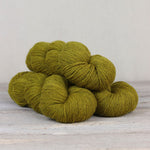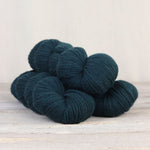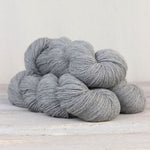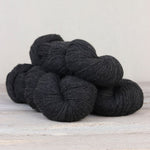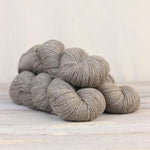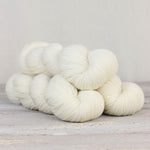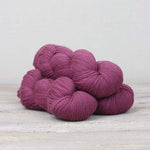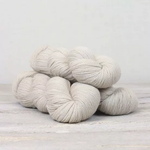When The Fibre Co. set out to design a sock yarn, they stayed true to their guiding principle of harnessing the beauty that nature provides in a way that is gentle on our planet. They waited until a recycled nylon and an alternative to the standard chlorine processed washable wools became available. The end result is a soft yet durable yarn from Merino wool and alpaca fibres processed with an eco-friendly anti-shrinkage Easy-wash treatment. The recycled nylon adds strength and durability.
Yarn weight: Fingering Hank weight: 100 g
Fibre: 70% Easy-wash Merino wool,
20% Easy-wash alpaca, 10% recycled nylon
Length: 325 m (355 yd) per 100 g hank
Tension / Gauge: 32 sts per 10 cm (4 in)
Needle size: 2.5mm (US 1.5)
If you'd like us to wind your yarn, please see here.
What does Easy-wash mean?
Easy-wash is a trademarked name that refers to a process used to make the wool and alpaca fibres in Amble machine washable without shrinking. The Easy-wash method is chlorine-free and AOX-free, making it the best environmental choice for producing machine washable wool. The wool and alpaca fibres are treated with eco-friendly oxidants to remove the scales that ordinarily cause wool and alpaca to shrink when washed by machine. The oxidants used are sourced in Germany and are certified under the REACH, Oeko-tex and ZDCH (Zero Discharge of Hazardous Chemical) standards. This means that the Easy-wash treatment does not create hazardous chemicals, which is not the case with most machine washable wools in today’s market.
Much of the available machine washable wool yarn is made with a chlorine treatment process that produces high levels of toxic Adsorbable Organohalogens, known as AOX. While yarns produced in this manner are not known to be toxic to the user, AOX used in the treatment end up in wastewater and have a detrimental impact on tributaries, wildlife, and fauna.
What is recycled nylon?
Nylon fibre is not easily biodegradable. However, it has strength qualities that give yarns and the socks made therefrom more durability. The recycled nylon used in our sock yarn Amble comes from leftover industrial waste of processing nylon, thereby diverting waste from landfills, and using fewer production resources like water and fossil fuels than virgin nylon.




















